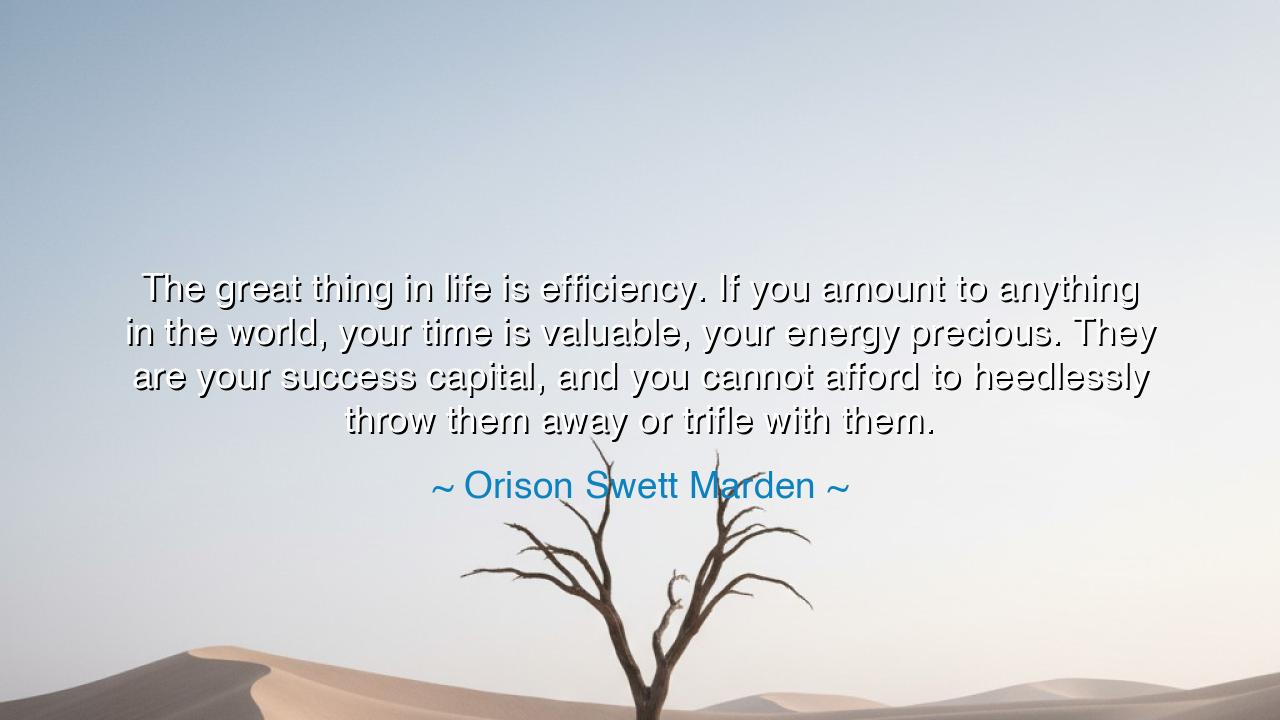
The great thing in life is efficiency. If you amount to anything
The great thing in life is efficiency. If you amount to anything in the world, your time is valuable, your energy precious. They are your success capital, and you cannot afford to heedlessly throw them away or trifle with them.






“The great thing in life is efficiency. If you amount to anything in the world, your time is valuable, your energy precious. They are your success capital, and you cannot afford to heedlessly throw them away or trifle with them.” — Orison Swett Marden
In these words, Orison Swett Marden, one of the early heralds of the modern philosophy of self-reliance and success, speaks with the clarity of an ancient sage and the urgency of one who has seen time slip through careless hands. His message is not merely about work or ambition—it is about reverence for the finite, about treating one’s hours and energy as sacred. When he says “the great thing in life is efficiency,” he is not praising cold calculation, but the art of directing one’s power with purpose, of living with discipline, intention, and dignity.
Marden, born in hardship and orphaned young, built his life on the principle that every moment well used is a brick laid toward greatness. He knew what it meant to start with little but the strength of one’s will. To him, efficiency was not mechanical; it was spiritual—a harmony between effort and aim. It meant channeling one’s limited time and strength toward what truly matters, and refusing to scatter them on trivial pursuits. In this, he echoes the ancient Stoics, who taught that the greatest tragedy is not death, but wasting life on things unworthy of it.
In the world’s long history, the mighty and the wise alike have understood this truth. Think of Leonardo da Vinci, whose genius spanned science, art, and invention, yet who lamented that time was always too short for what he longed to create. He guarded his energy as a sacred resource, rising before dawn, sketching by candlelight, recording every thought that might serve a future masterpiece. Or consider Benjamin Franklin, who divided his days by the hour, each segment devoted to a noble purpose. These were not men enslaved by routine—they were masters of their time, and through mastery, they achieved immortality.
Marden’s teaching stands as a call to awaken: to see time and energy as your life’s currency, the only wealth no one can replenish. Every idle hour, every distraction, every careless indulgence is a coin spent from your treasure of destiny. The wise do not hurry, but neither do they dawdle. They move with purposeful calm, like a river—ever flowing, never still, but never wasteful. To be efficient is not to rush; it is to move only toward that which serves your higher aim.
But there is another layer to Marden’s wisdom. He speaks also of self-respect—for one who values his time declares to the world that his life has meaning. To squander time is to confess that one’s purpose is small. Efficiency, then, is not greed for productivity; it is honor for existence. It means asking each morning: What is worthy of my strength today? and each night: Have I spent myself on what endures? Such questions shape the soul into one of focus, steadiness, and grace.
We see the opposite truth in the fate of many who had talent but no discipline. History remembers Nikola Tesla, a man of almost divine brilliance, yet whose energy was scattered among too many dreams, too many unfinished wonders. His inventions changed the world, but his life became a storm of exhaustion and loss. Marden’s warning is for all who, like Tesla, possess fire but not direction: without the channel, the flame consumes rather than illuminates.
So let this be your teaching, O seeker of wisdom: guard your time as a monarch guards his crown. Guard your energy as a warrior guards his blade. Do not spend your hours on trifles or your strength on pursuits that do not lift your soul. Efficiency is not speed—it is clarity. It is knowing what to do, why to do it, and when to stop. To live efficiently is to live deliberately, in tune with purpose and truth.
And when your days draw to a close, may you look back without regret, knowing you did not cast your hours to the wind. For he who honors his time honors his life—and in that honor, he finds greatness. As Marden teaches, your time and energy are not merely tools for success; they are the essence of your being. Use them well, and you shall not only “amount to something in the world,” but also leave behind the quiet legacy of one who lived with intention, mastery, and meaning.






AAdministratorAdministrator
Welcome, honored guests. Please leave a comment, we will respond soon